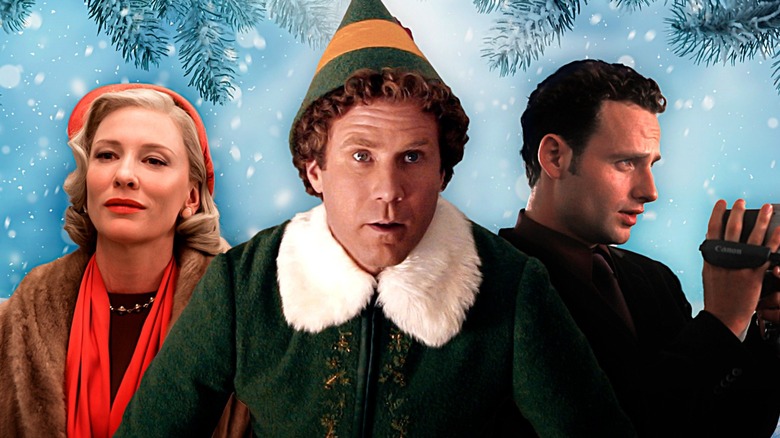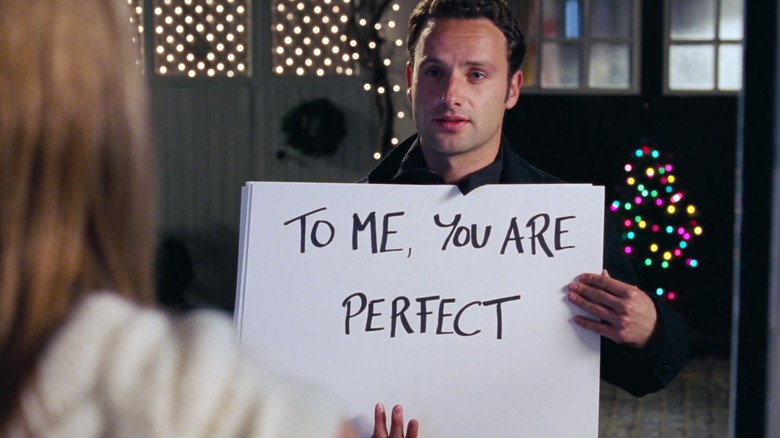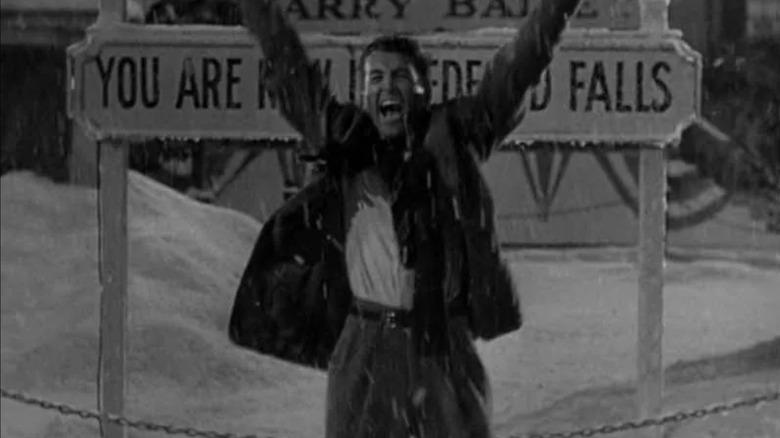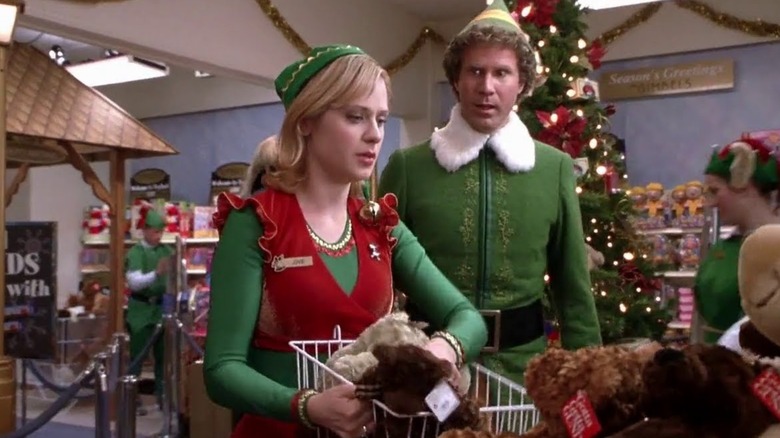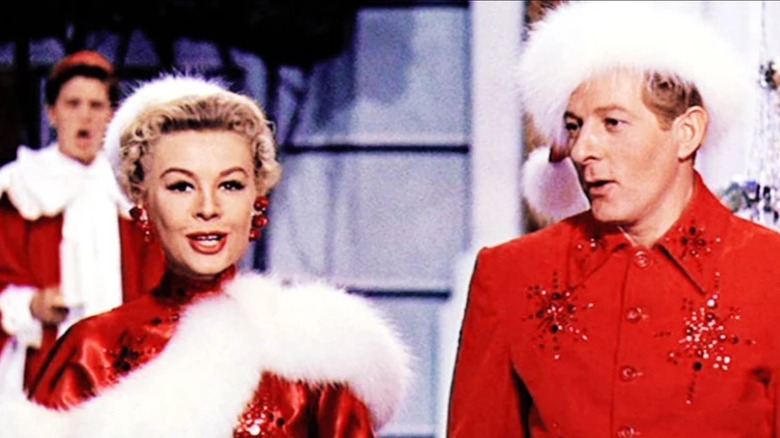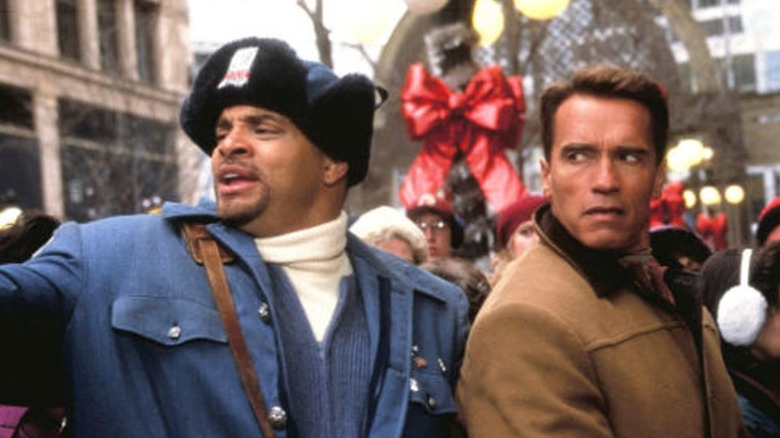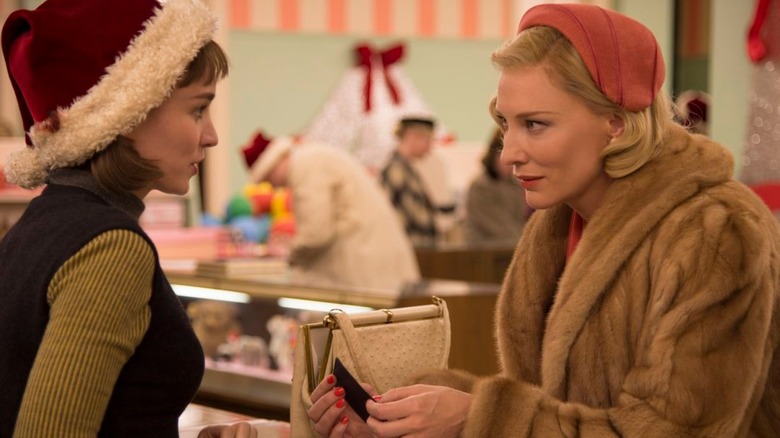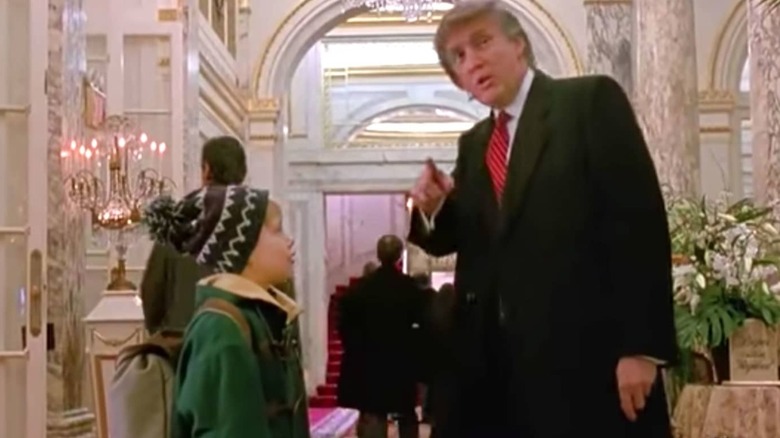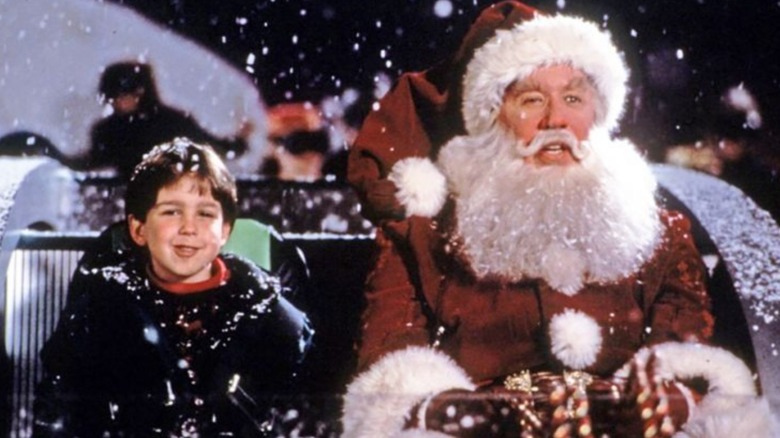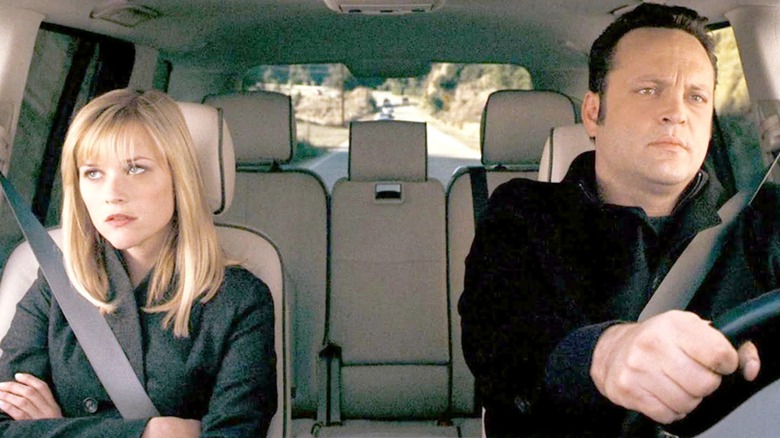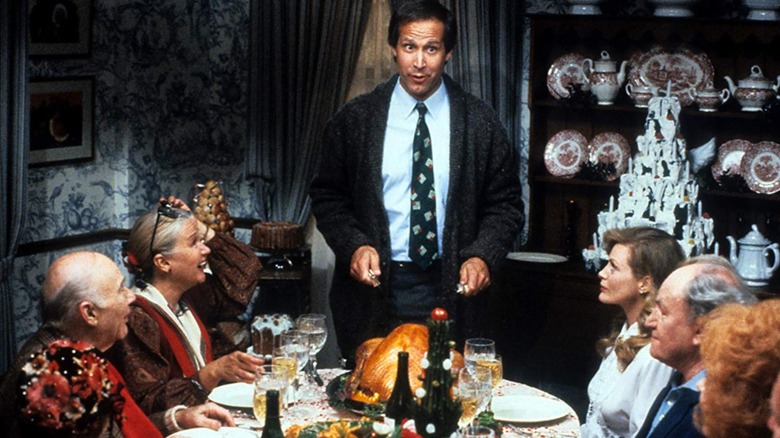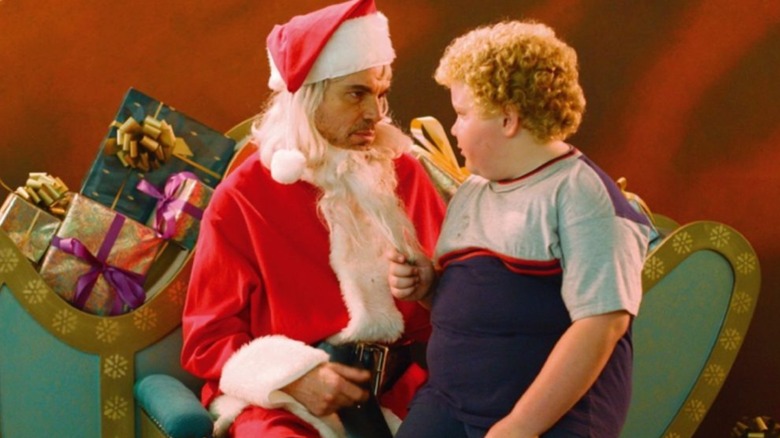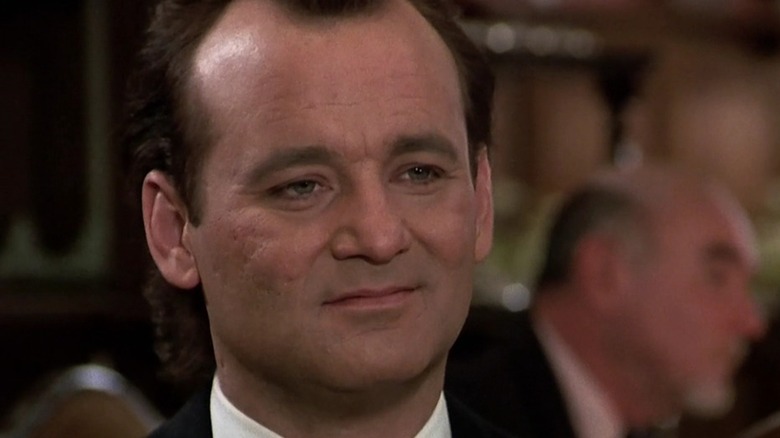The Controversies Behind Popular Christmas Movies Explained
For most, Christmas movies elicit feelings of magic and warmth, or conversely, nausea and annoyance. Some people anxiously await the onslaught of holiday movies during December, eagerly anticipating the next "A Christmas Story" or even a "Die Hard" that they can incorporate into their annual family holiday viewing. Others roll their eyes at the saccharine-sweet storylines that these films often feature. Regardless of which camp you fall into, it's nearly impossible to avoid the onrush of holiday films at the end of the year.
Christmas movies don't need to have a December release date, nor do they always directly center on the holiday. But they all revolve around Christmas in one way or another. When we reflect on Christmas movies of yore, "embroiled in controversy" isn't typically the first phrase that comes to mind. Yet behind the feel-good veneer of many of our favorite holiday films lurk controversies, behind-the-scenes drama, and numerous onscreen faux pas. Let's take a look at the controversies behind some popular Christmas movies.
Love Actually: Andrew Lincoln's slimy, entitled stalker
The opening scenes of "Love, Actually" hammer home the film's Christmas-adjacent message as Hugh Grant's narration reminds us that "love is all around us." The movie follows an ensemble cast of characters on their respective quests to find various types of lasting love. Sweet and tender moments, like those between the widower, Daniel (Liam Neeson), and his grieving stepson, Sam (Thomas Brodie-Sangster), eclipse many of the widespread controversial moments, but the film abounds with problematic plotlines.
In one of many controversial storylines in "Love Actually," Mark (Andrew Lincoln) realizes he's in love with Juliet (Keira Knightley), who has just married his best friend, Peter (Chiwetel Ejiofor). Until recently, Mark has only treated Juliet with seething contempt and borderline cruelty. When Lincoln's character abruptly shows up to pledge his love for Juliet, it doesn't appear romantic. The moment oozes majorly creepy stalker vibes.
Mark silently shuffles through cue cards that declare his sudden, undying devotion, and Juliet laughs and appears warmed by the gesture. The movie's writer-director, Richard Curtis, told Collider that he didn't recognize the controversy until years later. "I remember someone once saying they would like to interview me about it, and they would be focusing on the stalking scene," Curtis said. "And I said, 'Oh, I didn't know there was a stalking scene.' They said, 'Yeah, Andrew Lincoln. That's, like, top-notch stalking.' So, slowly but surely, I've realized what a dreadful mistake I made."
It's a Wonderful Life: Communist propaganda and the FBI
The beloved Christmas movie "It's A Wonderful Life" tells the story of George Bailey (James Stewart) and the sleepy, fictional town of Bedford Falls. When we first meet George, he's utterly distraught, having seen his life's dreams fall by the wayside. However, he remains positive until a mistake by his uncle (Thomas Mitchell) threatens to ruin the lives of everyone in town. George attempts suicide before Clarence (Henry Travers), an angel trying to earn his wings, rescues him and shows George the bleak existence his loved ones would've faced if he'd never been born. Despite its classic status today, "It's A Wonderful Life" was panned by critics for its sentimentality when it debuted in 1946, and it bombed at the box office.
The FBI also set its sights on the movie and its legendary director, Frank Capra. The agency's paranoid and controversial claims against the film included a vague and wild outcry over dark, anti-democracy subtext and communist propaganda. The FBI cited the villainization of the movie's capitalist tycoon, Mr. Potter (Lionel Barrymore), and George Bailey's community bank as signs of a communist message. Luckily, the federal HUAC (House Un-American Activities Committee) chose not to pursue an investigation of the Christmas movie. Capra later called the holiday classic "the greatest film I ever made" (via HuffPost).
If you or anyone you know is having suicidal thoughts, please call the National Suicide Prevention Lifeline at 1-800-273-TALK (8255).
Elf: The shower scene
Chock full of insanely quotable lines and a tenderhearted storyline, "Elf" proved that even modern films can instantly become classic Christmas movies. The story follows Buddy (Will Ferrell), a human raised at the North Pole as an elf. Although he's a middle-aged adult, Buddy embarks on a journey with child-like wonder to meet his birth father, Walter Hobbs (James Caan), in New York City. Hilarity and sweetness ensue as Buddy wins over those around him and falls in love with Jovie (Zooey Deschanel). We root for Buddy and cheer him on as he bonds with his half-brother Michael (Daniel Tay) and stepmother Emily (Mary Steenburgen). We laugh when he exclaims, "Santa? I know him!"
However, in the years since the film's release, some viewers have pointed out one controversial, risqué scene. Buddy has a crush on Jovie but doesn't know her yet. When he hears her singing from inside the Gimbels women's bathroom, he's intrigued. He saunters in and joins an unwitting Jovie in a duet of "Baby, It's Cold Outside." Buddy sits on the bathroom floor while Jovie showers, naked. The Christmas tune the duo sings has also come under scrutiny, as some people feel the lyrics allude to date rape. In an interview with Entertainment Weekly, Zooey Deschanel acknowledged the controversy but said the scene is purely innocent. "It's funny because obviously everyone knows it's not appropriate to walk in the girls' bathroom when someone's showering, but he's so believable as this guileless elf," she said. "It's weird he's in there, but you totally buy that his intentions are pure and innocent."
If you or anyone you know has been a victim of sexual assault, help is available. Visit the Rape, Abuse & Incest National Network website or contact RAINN's National Helpline at 1-800-656-HOPE (4673).
White Christmas: Vera-Ellen's singing voice was dubbed
Irving Berlin's smash hit tune "White Christmas" was originally used for the 1942 Christmas movie "Holiday Inn," starring Bing Crosby and Fred Astaire, and not for the eponymous 1954 cinema classic. However, the song became so popular (it holds the honor of the best-selling Christmas single of all time) that Paramount decided to build an entire film around it. The musical movie follows the story of Bob Wallace (Bing Crosby) and Phil Davis (Danny Kaye) who meet up with sisters Judy (Vera-Ellen) and Betty Haynes (Rosemary Clooney), to host a rural town's Christmas song and dance show. Heart-warming musical numbers abound, including "White Christmas," which is performed twice. Kaye and Clooney were already well-known for their vocal prowess, but there was one issue with the other leads — Vera-Ellen couldn't hold a tune.
Although Vera-Ellen appeared onscreen in multiple musicals, including "Let's Be Happy," her vocal performances were dubbed by various singers for each, and "White Christmas" was no exception. In the film, Judy Haynes belts out four songs, including the duet "Sisters" with Betty. For that track, Clooney provided both vocal parts. In Judy's other vocal showcases, Trudy Stevens sings. A controversial move by Paramount? Perhaps. Why wouldn't the studio just cast a triple-threat performer? However, "White Christmas" was the second-highest-grossing film of 1954 and remains a well-loved classic today.
Jingle All the Way: A stolen script?
When "Jingle All the Way" debuted in theaters, it bombed with critics and fans alike. The film attempted to satirize gross Christmas commercialism and promote a family-friendly message. However, the satire showed up in subtle, dark tones, and audiences didn't embrace the storyline. The Christmas movie centers on Howard Langston (Arnold Schwarzenegger), an overworked father who longs for a close relationship with his young son, Jamie (Jake Lloyd). Howard pledges to buy Jamie the highly-coveted Turbo-Man action figure for Christmas. Unfortunately, finding the toy is easier said than done, and Howard's quest pits him against Myron (Sinbad), who wants to buy his son a Turbo-Man as well. Questionably comical antics ensue. In the end, Howard ostensibly learns the true meaning of Christmas. Light on character and story development and full of darker undertones, the movie's poor ratings were eclipsed by the controversy that followed its release.
The Christmas movie became embroiled in scandal two years later when Murray Hill Publications sued Fox for plagiarism. The lawsuit claimed that Detroit-based teacher Brian Webster had written the original script, which was then copied and submitted by a studio script reader, Randy Kornfield. Webster and Murray Hill won the initial case, and Fox was ordered to pay $19 million. Although the verdict was appealed by Fox and later overturned, "Jingle All the Way" is still associated with the controversy.
Carol: Overlooked at the Oscars
The period drama "Carol" follows a sweeping and passionate love story, but it also qualifies as a Christmas movie. Set in the 1950s, the film follows the romance between an unhappily married, middle-aged New Jersey housewife, Carol Aird (Cate Blanchett), and a young Manhattan shopgirl who longs for a bigger and better life, Therese Belivet (Rooney Mara). Their relationship unfolds powerfully onscreen as the couple navigates the choppy LGBTQ+ waters of the period, when lesbian courtships evolved through code and subtext and existed mostly in secret. Much of the story unfolds throughout the holiday season, and Christmas plays a significant role in the film's first two acts. Beautiful storytelling and impressive performances from both Blanchett and Mara sparked Oscar buzz for possible best picture, best director, and best actress awards.
Shockingly, when the 2016 Oscar nominations were announced, the film was overlooked as a best picture contender, and director Todd Haynes was shut out, too. Although Blanchett and Mara were included in their respective categories, neither actress won an Oscar. Controversy swirled as some journalists speculated that the snubs came as a result of the film's foundationally LGBTQ+ plot. In an interview with Big Issue, when asked if he thought the Oscars overlooked "Carol" in part because of its queer subject matter, Haynes replied, "Well, yes. With all the discussions about race and diversity, one wonders to what degree that played."
Home Alone 2: The Donald Trump cameo
Long before Donald Trump became a divisive politician, he made a brief appearance in the quintessential Christmas movie sequel, "Home Alone 2: Lost in New York." In the follow-up to the smash-hit "Home Alone," poor Kevin McCallister (Macaulay Culkin) is abandoned by his family for Christmas — again. After suffering the bullying of his older brother Buzz (Devin Ratray) once more, Kevin sulks over the prospect of spending Christmas on vacation in Miami.
En route to Florida and separated from his group in the airport, Kevin ends up accidentally alone on a flight to New York City. Once there, Kevin stays at the Plaza Hotel, where Trump, playing himself, stops to give the young McCallister directions. "We approached The Plaza Hotel, which Trump owned at the time, because we wanted to shoot in the lobby," director, Chris Columbus told Insider in 2020. "We paid the fee, but [Trump] also said, 'The only way you can use the Plaza is if I'm in the movie.'"
Although the Christmas film is over 30 years old, after Trump's more recent actions, people called for his controversial appearance to be digitally removed from the film. Culkin voiced his support for the demand, replying positively to posts online that advocated for Trump's removal.
The Santa Clause: Sex line for kids
"The Santa Clause," ushered in a trilogy of family-friendly Christmas movies. Many critics had favorable reactions to the film, and controversy seemed far removed from its storylines and behind-the-scenes action. The movie stars Tim Allen as Scott Calvin, a toy company executive and divorced father of young Charlie (Eric Lloyd). On Christmas Eve, Scott accidentally causes Santa Claus to fall off his roof and, ostensibly, plummet tragically to his death. Charlie and Scott are magically whisked away to the North Pole, where Scott learns he must take over for the former Santa. Over the next year, Scott bonds with his son and undergoes an unnerving physical transformation as he slowly becomes the new Santa Claus. The story never veers into dark territory and suits its target young audience well.
Nevertheless, the original release of the movie inadvertently included a controversial scene. The short and shocking moment occurs when Scott's ex-wife Laura (Wendy Crewson) gives him a note with the number of her new mother-in-law. Scott glances at the paper and exclaims, "1-800-SPANK-ME? I know that number." Unfortunately, the number belonged to an actual, live sex hotline at the time. According to The Seattle Times, after watching the movie, two 9-year-old girls racked up $500 calling the number, and a kid in Long Island made $250 worth of calls. As a result, Disney removed the scene from all future copies of the film.
Four Christmases: Rumored hatred between the stars
The romantic comedy "Four Christmases" highlights the chaos and pressure many people experience when they visit multiple family members throughout the holiday season. After their Christmas trip to Fiji is accidentally canceled, Kate (Reese Witherspoon) and Brad (Vince Vaughn) are forced to visit each of their respective dysfunctional families for celebratory holiday get-togethers. In the process, the two discover that although they've been in a committed relationship for years, they might not know each other at all. In a flash-forward scene, the movie ends on a happy note as Kate and Brad welcome their first child. Despite the happy, warm emotions the movie elicits, rumors of onset acrimony between the stars became widely spread.
According to Decider, Witherspoon and Vaughn allegedly didn't get along at all. Stories leaked about Witherspoon's disdain for her onscreen love interest, and unnamed sources were quoted in the New York Daily News describing how the stars' clashing personalities led to tension behind the scenes. Reportedly, although their characters lived together and the actors had to portray the evolution of a long-term love story, Witherspoon refused to film a sex scene with Vaughn. The alleged bad feelings may have stemmed from the co-stars' vastly different acting styles or their intrinsic personality differences. Regardless of the exact truth, Witherspoon and Vaughn didn't appear together on the press tour for "Four Christmases" and haven't co-starred in any projects since.
National Lampoon's Christmas Vacation: Racist roots
Upon its release in 1989, "National Lampoon's Christmas Vacation" quickly became embedded in the holiday movie pantheon. The movie features the hapless, All-American Griswold family: dad Clark (Chevy Chase), mom Ellen (Beverly D'Angelo), their two kids Audrey (Juliette Lewis) and Rusty (Johnny Galecki), and outlandishly weird members of their extended family, including Cousin Eddie (Randy Quaid). The actors embody the characters with authenticity and hilarity as the Griswolds embark on wild holiday misadventures. For the most part, the story is light and wholesome, but its roots are far less so.
Legendary director John Hughes wrote the movie's screenplay and the short story "Christmas '59" upon which it's based. The controversial short story shares its familial basics with the film but also includes extremely racist tropes. For example, the story features the character Xgung Wo, a thief embodying many offensive Asian stereotypes who, when he visits the Griswolds for Christmas, offers to "sreep in your base-ments," among other things. Although Xgung Wo doesn't appear in the film version, he's suspiciously reminiscent of Long Duk Dong (Gedde Watanabe) from Hughes' "Sixteen Candles."
Bad Santa: The dark comedy almost didn't happen
For audiences who prefer their Christmas movies to examine the darker side of the holiday season, "Bad Santa" provides a palette cleanser from the sweetness of Christmas carols, cookies, and loving families. The dark comedy follows antihero Willie T. Soke (Billy Bob Thornton), a criminal with a litany of character flaws. Every Christmas, Willie poses as a mall Santa, while his partner-in-crime, Marcus (Tony Cox) poses as an elf. Together, they rob multiple shopping centers. However, Willie's plans are thwarted when he meets a young boy, Thurman (Brett Kelly), whom he begins to care for and who gives him a sliver of hope for his future. The film's unique approach to Christmas storytelling quickly cemented its place in the discussion of classic holiday films, but it almost landed on the desolate island of unmade movies.
Before "Bad Santa" found its home at Miramax, it was turned down by Universal. In a 2016 interview with The Irish Times, Bob Weinstein recalled asking people at Universal why they had passed on the script. He said that an unnamed studio executive replied, "It was the most foul, disgusting, misogynistic, anti-Christmas, anti-children thing we could imagine." In the end, though, the controversial nature of the film is exactly what made it stand out in a sea of feel-good Christmas movies.
Scrooged: Cast and crew found Bill Murray difficult
The Charles Dickens story "A Christmas Carol" has inspired hundreds of adaptations, including the movie "Scrooged." The holiday comedy tells the modern-day story of Frank Cross (Bill Murray), an Ebenezer Scrooge-type whose success has come at the cost of love in his life. Cross experiences similar ghostly encounters as Scrooge, which lead him to the path of redemption. "Scrooged" did well at the holiday box office and is often considered a Christmas classic. However, all was allegedly not so smooth on the set of the movie.
Occasionally, controversy has sparked about Bill Murray's rumored bullying behavior toward cast and crew on his various creative projects. Allegations of his inappropriate actions on the set of "Scrooged" have cropped up over the years, too. According to a 2021 report from Cracked, Murray made co-writer Michael O'Donoghue's life quite difficult during the film's shoot, demanding many script changes. Colleagues of the comedic actor once even dubbed him "The Murricane" due to his quick temper. Murray allegedly butted heads with the film's director, Richard Donner, too. In 1988, Donner spoke to the Toledo Blade about Murray's performance in the film, saying, "He's superbly creative but occasionally difficult — as difficult as any actor."
